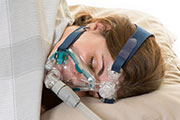- 10 Strategies to Overcome Insomnia
- Could Artificial Sweeteners Be Aging the Brain Faster?
- Techniques for Soothing Your Nervous System
- Does the Water in Your House Smell Funny? Here’s Why
- Can a Daily Dose of Apple Cider Vinegar Actually Aid Weight Loss?
- 6 Health Beverages That Can Actually Spike Your Blood Sugar
- Treatment Options for Social Anxiety Disorder
- Understanding the Connection Between Anxiety and Depression
- How Daily Prunes Can Influence Cholesterol and Inflammation
- When to Take B12 for Better Absorption and Energy
Sleep Apnea Treatment May Reverse Unhealthy Brain Changes


Sleep apnea treatment may reverse changes in brain stem activity associated with increased risk of heart disease, a new study suggests.
The findings “highlight the effectiveness of CPAP treatment in reducing one of the most significant health issues [heart disease] associated with obstructive sleep apnea,” the researchers concluded. CPAP stands for continuous positive airway pressure.
Previous research suggests that people with obstructive sleep apnea have greater activity in nerves associated with stress response, which can lead to high blood pressure and heart problems. This increased nerve activity is due to altered brain stem function caused by sleep apnea, earlier studies have shown.
In this small study, published recently in the Journal of Neurophysiology, Australian researchers found that CPAP treatment reduced that nerve activity by restoring normal brain stem function.
The study included 13 sleep apnea patients who were assessed before and after six months of CPAP treatment.
“These data strongly suggest that functional and anatomical changes within the brain stem, which we believe underlie the elevated sympathetic activity in individuals with untreated obstructive sleep apnea, can be restored to healthy levels by CPAP treatment,” the University of Sydney researchers wrote.
In obstructive sleep apnea, muscles in the airway collapse during sleep and block breathing. A CPAP device keeps airways open by delivering a steady flow of air while patients sleep.
More information
The U.S. National Heart, Lung, and Blood Institute has more about CPAP.
Source: HealthDay
Copyright © 2026 HealthDay. All rights reserved.










